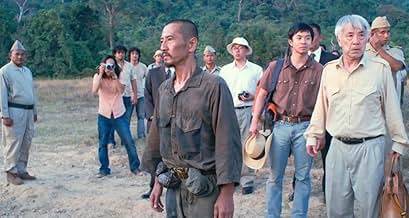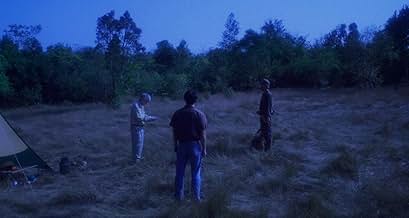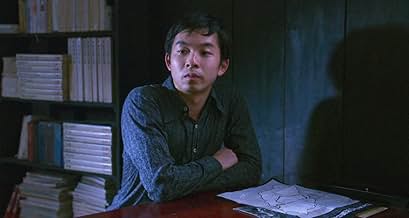VALUTAZIONE IMDb
7,2/10
3241
LA TUA VALUTAZIONE
Quando il Giappone si arrende alla fine della seconda guerra mondiale, il soldato Hiroo Onoda si ritira nella giungla delle Filippine per continuare lui stesso la guerra per altri diecimila ... Leggi tuttoQuando il Giappone si arrende alla fine della seconda guerra mondiale, il soldato Hiroo Onoda si ritira nella giungla delle Filippine per continuare lui stesso la guerra per altri diecimila giorni.Quando il Giappone si arrende alla fine della seconda guerra mondiale, il soldato Hiroo Onoda si ritira nella giungla delle Filippine per continuare lui stesso la guerra per altri diecimila giorni.
- Regia
- Sceneggiatura
- Star
- Premi
- 5 vittorie e 20 candidature totali
Yûya Endô
- Hiroo Onoda - Young
- (as Endô Yûya)
Kanji Tsuda
- Hiroo Onoda - Old
- (as Tsuda Kanji)
Yûya Matsuura
- Kinshichi Kozuka - Young
- (as Matsuura Yûya)
Tetsuya Chiba
- Kinshichi Kozuka - Old
- (as Chiba Tetsuya)
Shinsuke Kato
- Shôichi Shimada
- (as Katô Shinsuke)
Kai Inowaki
- Yûichi Akatsu
- (as Inowaki Kai)
Issei Ogata
- Major Yoshimi Taniguchi
- (as Issey Ogata)
Taiga Nakano
- Norio Suzuki - The Tourist
- (as Nakano Taïga)
Nobuhiro Suwa
- Tanejirô Onoda - Onoda's Father
- (as Suwa Nobuhiro)
Mutsuo Yoshioka
- Captain Hayakawa
- (as Yoshioka Mutsuo)
Tomomitsu Adachi
- Governor-General Shigenori Kuroda
- (as Adachi Tomomitsu)
Kyûsaku Shimada
- Lieutenant Suehiro
- (as Shimada Kyûsaku)
Jemuel Satumba
- Filipino Prisoner
- (as Jemuel Cedrick Satumba)
Ryû Morioka
- Student
- (as Ryu Morioka)
Akira Morita
- Extra
- (as Morita Akira)
Recensioni in evidenza
This is really an outstanding movie which is not a "war movie" but rather a complex psychological one of what drive us as a person to take a stand when confronted to situations we could not have ever imagined. Of course education, training, the society, family history, the culture of the country in which you were born, all of this will play a major role with regard to the choice(s) that we will take in life. However, as per prior personal experiences and call it maybe "the genetics" these choices will be different for people even having the same cultural background. The life story of lieutenant Onoda is maybe what you could call an "extreme" one which, besides cultural background, was certainly facilitated by his "physical adaptation" allowing him to endure the certain hardships and harrowing experiences he encountered during his many years of isolation.
Onoda is a long movie but its length was necessary not to develop the psychological development of the main character but rather to allow the viewer to "feel" what it must have meant in terms of hardship, endurance and faith the choices that Lieutenant Onoda took to honor his pledge of obedience regardless the validity of the cause he chose to defend.
The fact the movie Onoda was released in full pandemic, of the relatively unknown nature of the real history of lieutenant Onoda and that the film must only be shown in the Japanese language (with subtitles) as an indispensable component of the story will certainly limit its diffusion in theaters. Still this will not hamper the fact that this is cinema of the highest caliber and that Arthur Harari, its French director succeeded in making an admirable movie not to be missed!
Onoda is a long movie but its length was necessary not to develop the psychological development of the main character but rather to allow the viewer to "feel" what it must have meant in terms of hardship, endurance and faith the choices that Lieutenant Onoda took to honor his pledge of obedience regardless the validity of the cause he chose to defend.
The fact the movie Onoda was released in full pandemic, of the relatively unknown nature of the real history of lieutenant Onoda and that the film must only be shown in the Japanese language (with subtitles) as an indispensable component of the story will certainly limit its diffusion in theaters. Still this will not hamper the fact that this is cinema of the highest caliber and that Arthur Harari, its French director succeeded in making an admirable movie not to be missed!
The movie's really good. The beginning kinda drags on, despite you perfectly understanding the stakes, but it pays out in the end.
The characters are lovable, the story's not far from what really happened. The picture's great, although slightly blurry sometimes.
Really worth it.
The characters are lovable, the story's not far from what really happened. The picture's great, although slightly blurry sometimes.
Really worth it.
What a good surprise this film directed by a French and speaking of the war in the Pacific from the Japanese point of view. So unexpected and awesome in the same time. I could not believe that this young director is not under the influence of Clint Eastwood's LETTERS FROM IWO JIMA, John Boorman's HELL IN THE PACIFIC or Kon Ichikawa's FIRES IN THE PLAINS. Impossible for me to think that he would have never heard of those three iconic films. Back to this one, I don't know how anyone could say harm about it, except maybe a bit too long; yes, maybe. Plus, it speaks not only of the japanese soldiers, but not the kamikaze or simple fighters, but some kind of secret section of soldiers sent into a Philippines Island. The young director from France is also aware of the Mizoguchi's influence and with the poetic lines of the Japanese spirit. Good film to be watched at any cost. Only for this incredible but so authentic story.
Greetings again from the darkness. There has been no shortage of conspiracy theories, either recently or historically, that have left non-believers bewildered at how 'the other side' held firm. Writer-director Arthur Harari and his co-writers Bernard Cendron and Vincent Poymiro bring the remarkable struggle of Hiroo Onoda to the screen. Onoda was a Japanese soldier who refused to believe WWII ended, and instead, continued his mission of resistance by spending thirty years in a Filipino jungle.
Onoda was only 22 when he entered the war in 1944. He is played as a young man by Yuya Endo, and in later years by Kanji Tsuda. The film goes mostly in chronological order, with only occasional flashbacks to Onoda's "special training" by Taniguchi (Issey Ogata), his trainer and trainer. The passing of years is noted on screen, and we watch as Onoda's squadron shrinks in size, holding at four for quite a while, before shifting to two, and finally only he remains. During the special training, Taniguchi declares, "You don't have the right to die", instilling a firm commitment to the cause in Onoda.
Also seared into Onoda's brain is the proclamation of, "We'll come back for you. No matter how long it takes, we'll come back for you." Still, it's fascinating to see his determination to keep fighting, despite so many signs that the war was over. He viewed magazine articles and radio broadcasts as tricks to draw him away from his mission ... going so far to decipher a coded message that was anything but that.
The young man who finally succeeds in lulling Onoda out of the jungle has his own mission - actually three of them: finding a panda, locating Onoda (by this time a legend), and tracking down a Yeti. It's a bittersweet moment for the long-dedicated soldier, and he went on to live many more years as a home country icon - considered a nationalist man of honor by some, a murdering fool by others. The film, and Onoda's saga, makes us question the point of war when it's impossible to tell if the war is over or ongoing. Harari's film is almost three hours, which is entirely too long ... but significantly shorter than the time Onoda spent in the jungle.
Releasing in theaters on October 14, 2022.
Onoda was only 22 when he entered the war in 1944. He is played as a young man by Yuya Endo, and in later years by Kanji Tsuda. The film goes mostly in chronological order, with only occasional flashbacks to Onoda's "special training" by Taniguchi (Issey Ogata), his trainer and trainer. The passing of years is noted on screen, and we watch as Onoda's squadron shrinks in size, holding at four for quite a while, before shifting to two, and finally only he remains. During the special training, Taniguchi declares, "You don't have the right to die", instilling a firm commitment to the cause in Onoda.
Also seared into Onoda's brain is the proclamation of, "We'll come back for you. No matter how long it takes, we'll come back for you." Still, it's fascinating to see his determination to keep fighting, despite so many signs that the war was over. He viewed magazine articles and radio broadcasts as tricks to draw him away from his mission ... going so far to decipher a coded message that was anything but that.
The young man who finally succeeds in lulling Onoda out of the jungle has his own mission - actually three of them: finding a panda, locating Onoda (by this time a legend), and tracking down a Yeti. It's a bittersweet moment for the long-dedicated soldier, and he went on to live many more years as a home country icon - considered a nationalist man of honor by some, a murdering fool by others. The film, and Onoda's saga, makes us question the point of war when it's impossible to tell if the war is over or ongoing. Harari's film is almost three hours, which is entirely too long ... but significantly shorter than the time Onoda spent in the jungle.
Releasing in theaters on October 14, 2022.
The case of Onoda, a WW2 Japanese soldier who carried on fighting for thirty years on the Philippine island of Lubang before being persuaded to give up, was a celebrated case in the mid 1970s, and I was really impressed by this dramatic reconstruction of his life. It's a high quality movie, beautifully filmed, thoughtful, and well played all round, though I also thought it a bit too long at more than 2.5 hours. There are great performances all round and solid direction which almost has a David Lean approach at times (no bad thing), so it's a 'small scale epic' with a heart, and well worth a view. There are some supremely effective moments, and the film deserves a wider audience, though you do have spare quite a bit of time.
Lo sapevi?
- QuizWhilst set on a remote Philippines Island the film was in fact shot on location in the kingdom country of Cambodia.
I più visti
Accedi per valutare e creare un elenco di titoli salvati per ottenere consigli personalizzati
- How long is Onoda: 10,000 Nights in the Jungle?Powered by Alexa
Dettagli
- Data di uscita
- Paesi di origine
- Siti ufficiali
- Lingue
- Celebre anche come
- Onoda: 10,000 Nights in the Jungle
- Luoghi delle riprese
- Bokor National Forest, Cambodia(jungle)
- Aziende produttrici
- Vedi altri crediti dell’azienda su IMDbPro
Botteghino
- Budget
- 4.530.000 € (previsto)
- Lordo in tutto il mondo
- 262.276 USD
- Tempo di esecuzione2 ore 53 minuti
- Colore
- Proporzioni
- 1.85 : 1
Contribuisci a questa pagina
Suggerisci una modifica o aggiungi i contenuti mancanti

Divario superiore
What is the Canadian French language plot outline for Onoda - 10.000 Notti nella giungla (2021)?
Rispondi































